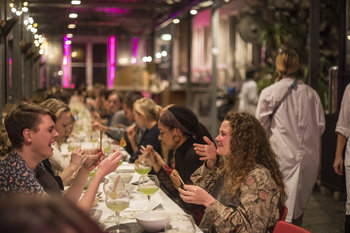Language
Language proficiency such as an individual who can't speak French well in Paris. Such an individual may benefit from slow speaking and plain speaking that helps them to comprehend. If you can speak their native language, this may also help them a great deal.Food
Food restrictions such as someone from a vegetarian society, culture or religion. For example, airlines typically provide vegetarian options to serve this customer need.Beliefs
Beliefs such as a religion or personal principle that an individual uses to govern their choices. For example, beliefs that may cause individuals not to grant informed consent for a medical treatment.Traditions
Traditions such as a traditional holiday. For example, an employee who feels that they need to take off an important religious holiday.Sensibilities
Sensibilities are principles of correctness that are considered obvious in a culture. This can cause quite strong feelings that something is not right when immersed in a mainstream culture with difference sensibilities. For example, a culture that strongly feels that shoes are unclean and should never be worn in a home. This sensibility may cause problems if a service representative visits a home and refuses to remove their shoes.Norms
Norms such as conventions of politeness in a culture. For example, a team that is accustomed to direct and candid criticism that interfaces with a team from a culture where saving face is the norm. This may require a flexible approach from both sides to prevent miscommunication or harsh feelings.Practices
Practices such as religious observances. For example, an office that provides a space for religious observances or personal reflection that is designed to suit various cultural and personal needs.Values
Values such as a culture that prioritizes traditional roles and duty over individualism and freedom. This simply requires respect whereby you understand that people think and live differently and don't look down on others or try to change their mind in a naive, condescending or biased way.Inclusion
People with differing cultures need to be included in things. For example, a neighborhood that excludes a family from social events due to language issues. Effort can be made to include people from different cultures and to build relationships with them as you would anyone else.Communication
The need for communication and understanding. For example, a restaurant that doesn't ask perceived foreigners standard questions that are asked of customers that are perceived as locals.Assumptions
People with differing cultures often suffer from the untrue assumptions of others. As such, it is always better to ask then to assume. For example, avoiding the assumption that someone is or isn't interested in something because of their cultural background. For example, assuming that someone must love a particular food because of their nationality.Patience
Communication and social processes can take more effort and time when they involve different cultures. People need your patience and effort. For example, an individual on a flight who doesn't speak the languages supported by the crew who needs the crew to continue to treat them with respect and courtesy by trying to communicate with approaches such as pointing, body language, eye contact and facial expressions.Empathy
Beyond the particular sensibilities, norms, values and restrictions that people have based on their culture -- people need respect, fairness and empathy from others. For example, an Austrian who is sympathetic with American travelers who may have to deal with language problems, cultural barriers and unfriendly stereotypes.Notes
Culture is a broad concept that extends far beyond things like nationality and ethnicity. For example, generations tend to have unique culture such as norms and sensibilities.| Overview: Cultural Needs | ||
Type | ||
Definition | Things that are necessary or helpful for an individual to thrive due to their cultural background.. | |
Related Concepts | ||




























